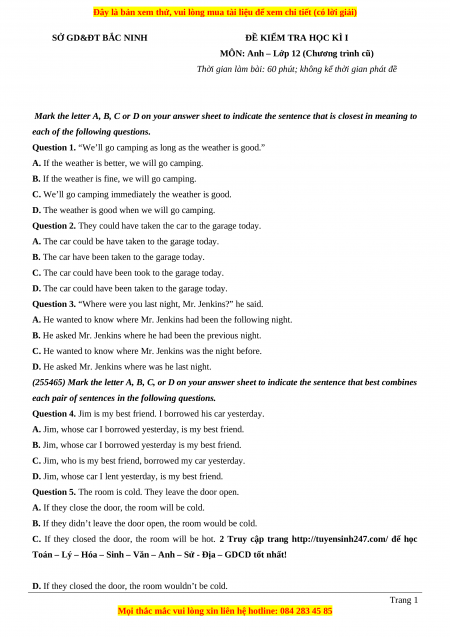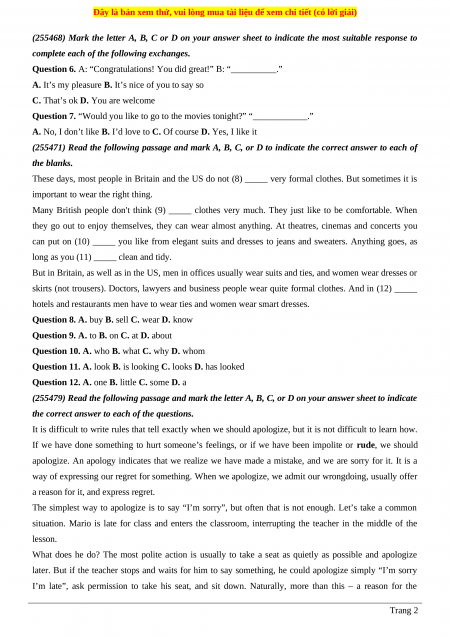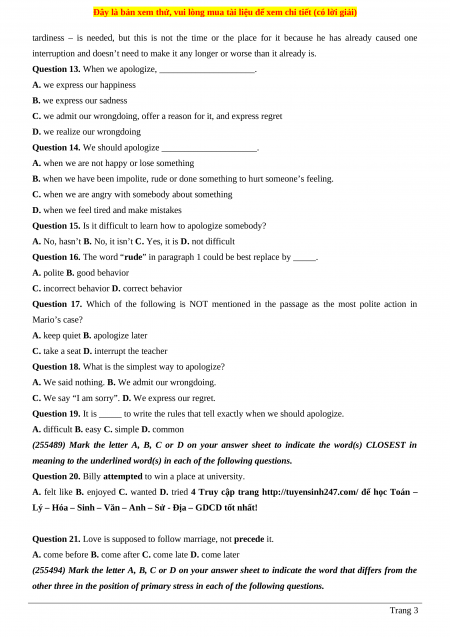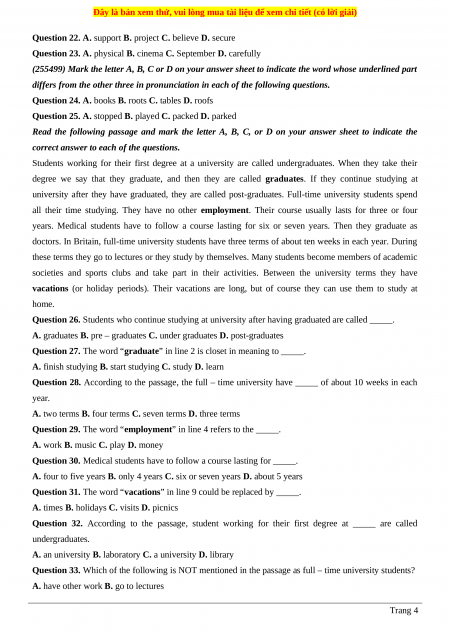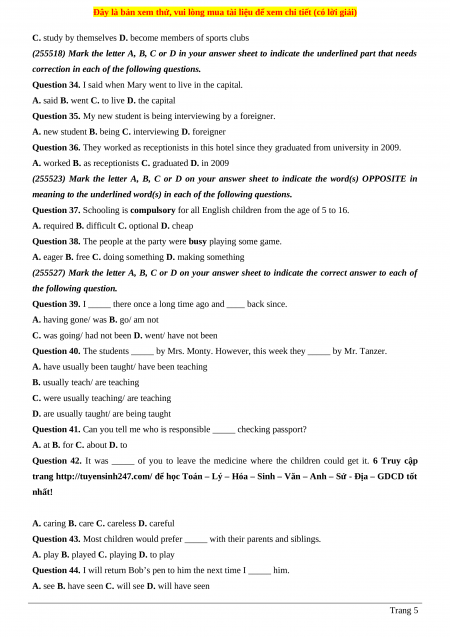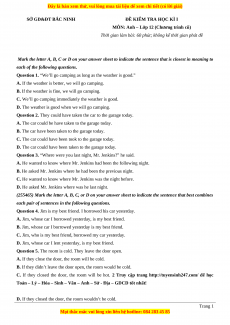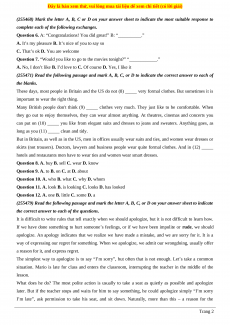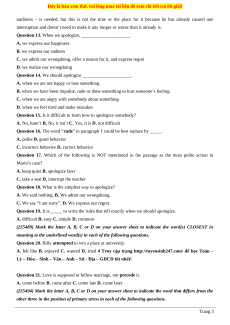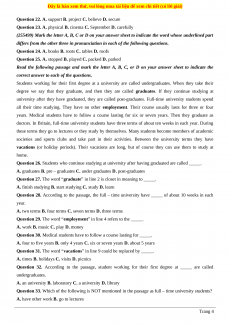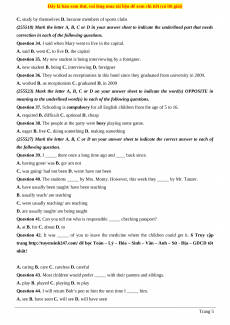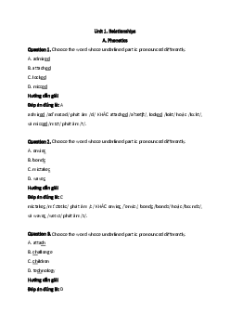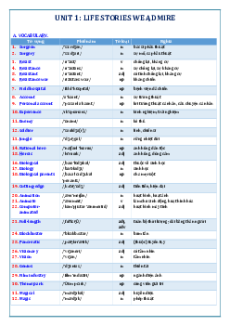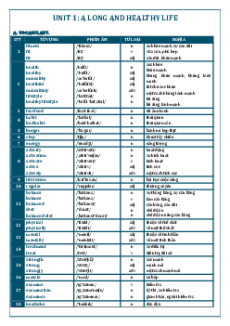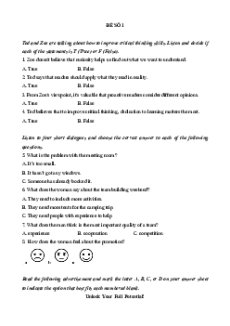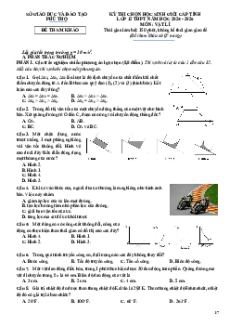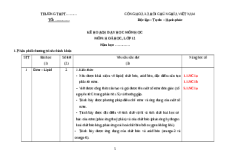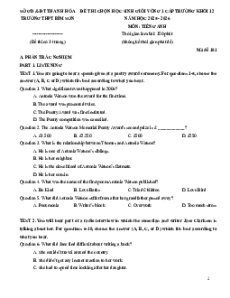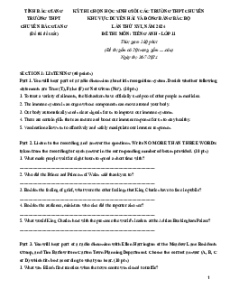SỞ GD&ĐT BẮC NINH
ĐỀ KIỂM TRA HỌC KÌ I
MÔN: Anh – Lớp 12 (Chương trình cũ)
Thời gian làm bài: 60 phút; không kể thời gian phát đề
Mark the letter A, B, C or D on your answer sheet to indicate the sentence that is closest in meaning to
each of the following questions.
Question 1. “We’ll go camping as long as the weather is good.”
A. If the weather is better, we will go camping.
B. If the weather is fine, we will go camping.
C. We’ll go camping immediately the weather is good.
D. The weather is good when we will go camping.
Question 2. They could have taken the car to the garage today.
A. The car could be have taken to the garage today.
B. The car have been taken to the garage today.
C. The car could have been took to the garage today.
D. The car could have been taken to the garage today.
Question 3. “Where were you last night, Mr. Jenkins?” he said.
A. He wanted to know where Mr. Jenkins had been the following night.
B. He asked Mr. Jenkins where he had been the previous night.
C. He wanted to know where Mr. Jenkins was the night before.
D. He asked Mr. Jenkins where was he last night.
(255465) Mark the letter A, B, C, or D on your answer sheet to indicate the sentence that best combines
each pair of sentences in the following questions.
Question 4. Jim is my best friend. I borrowed his car yesterday.
A. Jim, whose car I borrowed yesterday, is my best friend.
B. Jim, whose car I borrowed yesterday is my best friend.
C. Jim, who is my best friend, borrowed my car yesterday.
D. Jim, whose car I lent yesterday, is my best friend.
Question 5. The room is cold. They leave the door open.
A. If they close the door, the room will be cold.
B. If they didn’t leave the door open, the room would be cold.
C. If they closed the door, the room will be hot. 2 Truy cập trang http://tuyensinh247.com/ để học
Toán – Lý – Hóa – Sinh – Văn – Anh – Sử - Địa – GDCD tốt nhất!
D. If they closed the door, the room wouldn’t be cold. Trang 1
(255468) Mark the letter A, B, C or D on your answer sheet to indicate the most suitable response to
complete each of the following exchanges.
Question 6. A: “Congratulations! You did great!” B: “__________.”
A. It’s my pleasure B. It’s nice of you to say so
C. That’s ok D. You are welcome
Question 7. “Would you like to go to the movies tonight?” “____________.”
A. No, I don’t like B. I’d love to C. Of course D. Yes, I like it
(255471) Read the following passage and mark A, B, C, or D to indicate the correct answer to each of the blanks.
These days, most people in Britain and the US do not (8) _____ very formal clothes. But sometimes it is
important to wear the right thing.
Many British people don't think (9) _____ clothes very much. They just like to be comfortable. When
they go out to enjoy themselves, they can wear almost anything. At theatres, cinemas and concerts you
can put on (10) _____ you like from elegant suits and dresses to jeans and sweaters. Anything goes, as
long as you (11) _____ clean and tidy.
But in Britain, as well as in the US, men in offices usually wear suits and ties, and women wear dresses or
skirts (not trousers). Doctors, lawyers and business people wear quite formal clothes. And in (12) _____
hotels and restaurants men have to wear ties and women wear smart dresses.
Question 8. A. buy B. sell C. wear D. know
Question 9. A. to B. on C. at D. about
Question 10. A. who B. what C. why D. whom
Question 11. A. look B. is looking C. looks D. has looked
Question 12. A. one B. little C. some D. a
(255479) Read the following passage and mark the letter A, B, C, or D on your answer sheet to indicate
the correct answer to each of the questions.
It is difficult to write rules that tell exactly when we should apologize, but it is not difficult to learn how.
If we have done something to hurt someone’s feelings, or if we have been impolite or rude, we should
apologize. An apology indicates that we realize we have made a mistake, and we are sorry for it. It is a
way of expressing our regret for something. When we apologize, we admit our wrongdoing, usually offer
a reason for it, and express regret.
The simplest way to apologize is to say “I’m sorry”, but often that is not enough. Let’s take a common
situation. Mario is late for class and enters the classroom, interrupting the teacher in the middle of the lesson.
What does he do? The most polite action is usually to take a seat as quietly as possible and apologize
later. But if the teacher stops and waits for him to say something, he could apologize simply “I’m sorry
I’m late”, ask permission to take his seat, and sit down. Naturally, more than this – a reason for the Trang 2
tardiness – is needed, but this is not the time or the place for it because he has already caused one
interruption and doesn’t need to make it any longer or worse than it already is.
Question 13. When we apologize, _____________________.
A. we express our happiness
B. we express our sadness
C. we admit our wrongdoing, offer a reason for it, and express regret
D. we realize our wrongdoing
Question 14. We should apologize _____________________.
A. when we are not happy or lose something
B. when we have been impolite, rude or done something to hurt someone’s feeling.
C. when we are angry with somebody about something
D. when we feel tired and make mistakes
Question 15. Is it difficult to learn how to apologize somebody?
A. No, hasn’t B. No, it isn’t C. Yes, it is D. not difficult
Question 16. The word “rude” in paragraph 1 could be best replace by _____.
A. polite B. good behavior
C. incorrect behavior D. correct behavior
Question 17. Which of the following is NOT mentioned in the passage as the most polite action in Mario’s case?
A. keep quiet B. apologize later
C. take a seat D. interrupt the teacher
Question 18. What is the simplest way to apologize?
A. We said nothing. B. We admit our wrongdoing.
C. We say “I am sorry”. D. We express our regret.
Question 19. It is _____ to write the rules that tell exactly when we should apologize.
A. difficult B. easy C. simple D. common
(255489) Mark the letter A, B, C or D on your answer sheet to indicate the word(s) CLOSEST in
meaning to the underlined word(s) in each of the following questions.
Question 20. Billy attempted to win a place at university.
A. felt like B. enjoyed C. wanted D. tried 4 Truy cập trang http://tuyensinh247.com/ để học Toán –
Lý – Hóa – Sinh – Văn – Anh – Sử - Địa – GDCD tốt nhất!
Question 21. Love is supposed to follow marriage, not precede it.
A. come before B. come after C. come late D. come later
(255494) Mark the letter A, B, C or D on your answer sheet to indicate the word that differs from the
other three in the position of primary stress in each of the following questions. Trang 3
Question 22. A. support B. project C. believe D. secure
Question 23. A. physical B. cinema C. September D. carefully
(255499) Mark the letter A, B, C or D on your answer sheet to indicate the word whose underlined part
differs from the other three in pronunciation in each of the following questions.
Question 24. A. books B. roots C. tables D. roofs
Question 25. A. stopped B. played C. packed D. parked
Read the following passage and mark the letter A, B, C, or D on your answer sheet to indicate the
correct answer to each of the questions.
Students working for their first degree at a university are called undergraduates. When they take their
degree we say that they graduate, and then they are called graduates. If they continue studying at
university after they have graduated, they are called post-graduates. Full-time university students spend
all their time studying. They have no other employment. Their course usually lasts for three or four
years. Medical students have to follow a course lasting for six or seven years. Then they graduate as
doctors. In Britain, full-time university students have three terms of about ten weeks in each year. During
these terms they go to lectures or they study by themselves. Many students become members of academic
societies and sports clubs and take part in their activities. Between the university terms they have
vacations (or holiday periods). Their vacations are long, but of course they can use them to study at home.
Question 26. Students who continue studying at university after having graduated are called _____.
A. graduates B. pre – graduates C. under graduates D. post-graduates
Question 27. The word “graduate” in line 2 is closet in meaning to _____.
A. finish studying B. start studying C. study D. learn
Question 28. According to the passage, the full – time university have _____ of about 10 weeks in each year.
A. two terms B. four terms C. seven terms D. three terms
Question 29. The word “employment” in line 4 refers to the _____.
A. work B. music C. play D. money
Question 30. Medical students have to follow a course lasting for _____.
A. four to five years B. only 4 years C. six or seven years D. about 5 years
Question 31. The word “vacations” in line 9 could be replaced by _____.
A. times B. holidays C. visits D. picnics
Question 32. According to the passage, student working for their first degree at _____ are called undergraduates.
A. an university B. laboratory C. a university D. library
Question 33. Which of the following is NOT mentioned in the passage as full – time university students?
A. have other work B. go to lectures Trang 4
Đề thi học kì 1 Tiếng anh 12 năm 2022 - 2023 (Đề 15)
CÁCH MUA:
- B1: Gửi phí vào TK:
1133836868- CT TNHH DAU TU VA DV GD VIETJACK - Ngân hàng MB (QR) - B2: Nhắn tin tới Zalo VietJack Official ( nhấn vào đây ) để xác nhận thanh toán và tải tài liệu - giáo án
Liên hệ ngay Hotline hỗ trợ: 084 283 45 85
Đề thi được cập nhật liên tục trong gói này từ nay đến hết tháng 6/2023. Chúng tôi đảm bảo đủ số lượng đề đã cam kết hoặc có thể nhiều hơn, tất cả có BẢN WORD, LỜI GIẢI CHI TIẾT và tải về dễ dàng.
Để tải tài liệu gốc về máy bạn click vào nút Tải Xuống ở trên!
Thuộc bộ (mua theo bộ để tiết kiệm hơn):
-
Tailieugiaovien.com.vn giới thiệu bộ 21 đề thi học kì 1 môn Tiếng Anh lớp 12 mới nhất năm 2022 - 2023 nhằm giúp Giáo viên có thêm tài liệu tham khảo ra đề thi Tiếng anh lớp 12.
-
File word có lời giải chi tiết 100%.
-
Mua trọn bộ sẽ tiết kiệm hơn tải lẻ 50%.
Đánh giá
4.6 / 5(879 )Trọng Bình
Giúp ích cho tôi rất nhiều
Duy Trần
Rất thích tài liệu bên VJ soạn (bám sát chương trình dạy)
TÀI LIỆU BỘ BÁN CHẠY MÔN Tiếng Anh
Xem thêmTÀI LIỆU BỘ BÁN CHẠY Lớp 12
Xem thêmTài liệu bộ mới nhất





